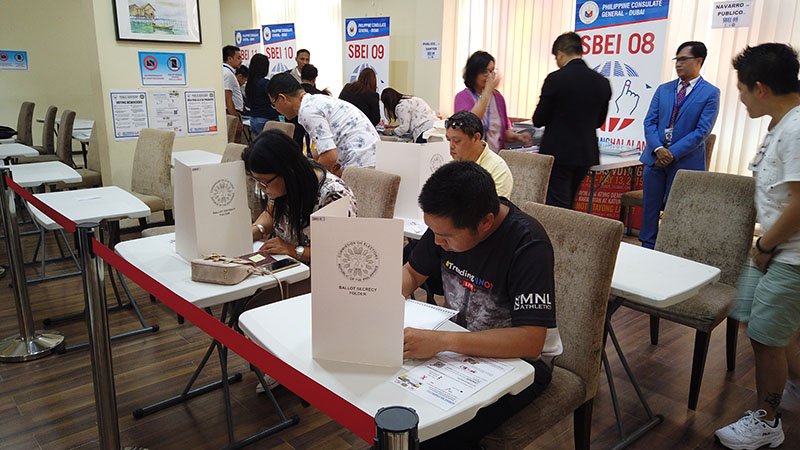How Overseas Filipino Voters Can Wield Clout in May ’22 Polls
/A couple registering to vote at the Philippine Consulate in San Francisco (Source: Inquirer.net)
An Overseas Filipino is a person of full or partial Philippine ancestry who resides or works abroad.
According to a dated December 2013 report posted on the Commission on Filipinos Overseas (CFO) website (cfo.gov.ph), there are an estimated 10.2 million Filipinos residing or working overseas who fall into three general categories:
4.8 million Permanent migrants which include immigrants, permanent residents, and naturalized citizens of their host country;
4.2 million Temporary migrants that include documented land-based and sea-based workers, otherwise known as overseas Filipino workers or OFWs; and
1.2 million Irregular migrants who are without valid residence or work permits, or who may be overstaying workers or tourists in a foreign country.
As of 2018, there were more than 150,000 OFs who opted for dual citizenship, most of whom reside in the United States.
For purposes of a Philippine election, Section 4 of Comelec Resolution 10730 provides that it is unlawful for any foreigner, whether a juridical or natural person, to directly or indirectly aid any candidate, or political party, organization or coalition, or to take part in, or influence in any manner, any election, or to contribute or make any expenditure in connection with any election campaign or partisan political activity.
Economic Clout!
Overseas remittances contribute to the Philippines’ Gross Domestic Product.
The monies sent by OFs contribute a steady ten percent (much more if you factor in money sent through unofficial channels) to the country’s Gross Domestic Product.
Remittances yielded a record high $33.5 billion in 2019 and despite the pandemic, still reached $31.5 billion in late 2021. Those based in the United States are the runaway top givers sending $12 billion (approximately 40% of the total remittances) in 2020.
Money transfers have played a significant role in maintaining the well-being of the Philippine economy. The macroeconomic benefits are plain. They not only contribute to the country’s gross international reserves but also help stabilize foreign exchange rates. The Peso strengthens with higher remittances which, in turn, reinforce the nation's balance of payments position.
A stronger peso also reduces the country’s liabilities which are mostly denominated in foreign currency. This becomes all the more important as the country ended 2021 with a whopping 11.7-trillion-peso debt. Remittances are the second-largest source of foreign reserves after exports, even surpassing the foreign direct investment flows.
From a micro economic perspective, these monies have supported millions of households in the Philippines. Remittances are “drivers of domestic demand” and consumption that propel purchasing power especially in the provinces.
Many economists have cited a direct positive correlation between remittances and improved health care, education, and entrepreneurial pursuits which have translated to a higher standard of living.
Electoral impotence?
Overseas Absentee Voting in the UAE (Source: expatmedia.net)
Every vote counts. An Informed vote dictated by one’s conscience counts even more. Yet, the OF’s influence in Philippine elections is completely disproportionate to their economic contributions to the country.
The highest overseas Filipino voter turnout occurred during the 2016 elections where 31.45% (approximately 432,000 voters) cast their votes. However, this figure comprised less than 1% of the total actual voters in the elections.
For 2022, Comelec will print over 65.7 million ballots of which 1.7 million (about 2.6%) are allocated for OFs. But the latter may have significantly decreased because of the repatriation of over 800,000 OFWs back to the Philippines due to the pandemic. OFs enjoy a 30-day voting period running from April 10 to May 9, 2022.
OFs can however participate more than cast a ballot. Many lived through the Martial law years and can “remit” a generous lesson in the real legacy of this dark era in Philippine history. Those who marched along EDSA in February 1986 can “send” a balikbayan box filled to the brim with stories of the People Power revolution that ended a despotic and rapacious regime.
Many can ship a freight of valuable wisdom, based on grounded historical perspective and true understanding of the political events that shaped the collective life of our people. Amidst the incessant social media disinformation campaign, OFs can play a crucial role in disseminating true and accurate information that can influence the 99% of the citizenry whose votes will decide the fate of our nation.
Action plan
The OFs can intensify their participation in the 2022 elections using technology. For example, they can make a “zoomitment” to host regular meetings with relatives, friends, schoolmates, former workmates, etc., who are voters in the Philippines that are still undecided or still persuadable. They should identify people whom they have provided assistance in the past (e.g., sent a balikbayan box to) as they would be more susceptible to listen to them.
During the zoom, listen intently to these voters and learn about the problems they are facing and their concerns for the future.
Emphasize the importance of electing the right leaders for our country. Explain the conditions why you left the country to explore greener pastures abroad.
Help them understand that leaders with a proven track record present the best chance of addressing the country’s challenges and future aspirations.
Try to get them to help spread the gospel of good governance and convince at least two more individuals in the Philippines to campaign for the right candidates.
“Every vote counts. Yet, the OFWs’ influence in Philippine elections is completely disproportionate to their economic contributions to the country. ”
These zoom meetings may be the best way to harness the tremendous influence of OFs that will help turn the electoral tide.
OFs all over the world should be applauded for their contributions. But they can contribute more than their hard-earned dollars; they can transfer the stronger currency of truth-telling and combat the infodemic of fake news.
George Orwell said “In a time of deceit, telling the truth is a revolutionary act.” OFs can be peaceful revolutionaries whose unstinting remittances in truth will steer our nation to an enlightened vote in May 2022.
Before serving as chairperson of the Philippine Commission on Elections (2015-17) and Presidential Commission on Good Government (2010-15) the agency tasked to recover the Marcos ill-gotten wealth, Andy Bautista worked with two international law firms in New York and Hong Kong (1993-2006). He also served as dean of the Far Eastern University Institute of Law (1999-2013).
More articles from Andres D. Bautista






